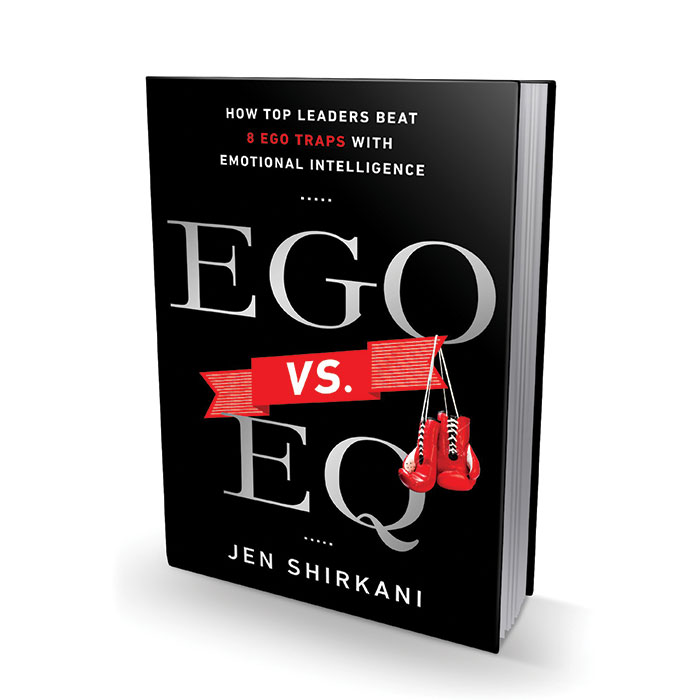
Emotional Intelligence Workshops
We offer several half-day or full-day interactive programs designed to raise awareness and provide practical
tools and take-aways for increasing the overall effectiveness of your employees. Our content includes:

EGO
VS EQ
As people grow in their careers and reach high levels of leadership, senior leaders can lose the ability to use their Emotional Intelligence (EQ) that keeps them connected to their employees. The risk of falling into “ego traps” increases, hurting the organization and threatening their hard-won success. In this session, participants learn about eight ego traps that are common in senior leaders, ways to avoid them, and participate in a self-assessment. Copies of Jen Shirkani’s book, Ego vs EQ (link to www.egovseq.com) are provided to each attendee.

LEADING WITH EMOTIONAL INTELLIGENCE

SHEQ

BUILDING TRUST AND GAINING RESPECT

THE CASE FOR CONFLICT

Leveraging the Power of EQ
Someone with high Emotional Intelligence (EQ) demonstrates a sensibility –he or she can influence others more effectively, can manage change well, solves problems calmly, uses humor to build rapport, and remains optimistic even in the face of adversity. Emotionally intelligent organizations engage customers, prospects and employees to build strong relationships and drive loyalty. Attendees are able to take a short self-assessment to better understand their EQ level. This presentation provides details on the characteristics of EQ, provides statistics on EQ’s connection to individual and organizational effectiveness and ways to achieve better business results. Learn ways to leverage the power of EQ to improve self-management skills, gain more interpersonal effectiveness and build stronger influence with others.

HOW TO BUILD RESILIENCE USING EQ
We all make choices every day, but too often when given the option, we choose to resist doing things that make us uneasy or uncomfortable. This course provides participants with current research on emotional intelligence and resiliency. We explore ways to utilize the MOST model (Motivation, Optimism, and Stress Tolerance) as an exit strategy to overcome barriers that can limit your ability to be resilient when unforeseen circumstances arise. It includes a self-assessment and unveils a process for taking a proactive approach to building your EQ in anticipation of challenges that could inhibit your development or limit your success. Copies of Jen Shirkani’s book, Choose Resilience are provided to each attendee.

INTERVIEWING AND HIRING FOR EQ
This learning session dives into the landscape of the labor market today and the proven techniques being used by industry leaders for successful talent acquisition. Participants will receive a simple, yet powerful tool for quickly identifying the EQ skills most important for each job, along with the technique for revealing truthful information about the candidate’s experience. This session will help interviewers take back the advantage and uncover high or low Emotional Intelligence skills during their interviewing and selection process.

CHANGING MINDS FOR CHANGING TIMES

Advanced Communication Strategies
Our Advanced Communication Strategies course develops the skills necessary to maximize each and every interaction, by developing rapport and building relationships despite diverse behavioral styles, that provide your workforce with a solid foundation for success. Utilizing either the 360° Social Styles feedback report or the TTI Success Factors DiSC report, participants will learn their own preferred communication style and the strengths and associated blind spots we all experience. The course provides a deep dive into the behavioral patterns that affect interpersonal relationships at all levels. The outcome is better quality communication – leading to higher levels of individual and organizational performance. The content includes an increase in participant Emotional Intelligence skills, particularly self-awareness, self-control, empathy and social skill; a framework of behaviors to use as a tool to observe and interpret verbal and non-verbal cues from others; strategies for diminishing stress responses from others (AKA bad behaviors) and techniques for increasing social skills that improve rapport and influence with others.